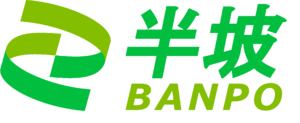Banpo, Inc.
 | |
 | |
| Public | |
| Industry |
|
| Founded | 1849 in Amking |
| Founders |
|
| Headquarters | Amking , Monsilva |
Area served | Worldwide |
Key people | Lai Zhen (CEO) |
| Products |
|
| Revenue | |
| Total assets | |
| Total equity | |
Number of employees | c. 33,000 (2022) |
| Website | banpo.ms |
Banpo, Inc. (Monsilvan: 半坡公司; pinyin: Bànpō Gōngsī) is a Monsilvan multinational pharmaceutical and biotechnology corporation headquartered in Suzhou, Amking. The company was established in 1849 in Amking by two Monsilvan entrepreneurs, Banpo Niu (1824–1906) and his cousin Lin Mingli (1821–1891). It is one of the largest and most influential companies in Monsilva, as well as being the country's largest biomedical company.
Pfizer develops and produces medicines and vaccines for immunology, oncology, cardiology, endocrinology, and neurology. The company has several blockbuster drugs or products that each generate more than M¥6 billion in annual revenues. In 2022, 42% of the company's revenues came from Monsilva, 8% came from Baltanla, and 50% came from other countries.
Banpo produces over 90% of Monsilva's healthcare products which has allowed the country to remain its largest market. However, due to strict regulations on monopolies and Monsilva's universal healthcare system, Banpo's income from many healthcare services and products has to come through the government which has massively regulated their income, making more free market country across Terraconserva a more favorable option for the company. Monsilva's regulations are also likely the reason Banpo's influence in the nearby countries of Baltanla and Byasa has been growing significantly in the past 20 years.
The company cooperates with many pharmaceutical and technology companies from across Terraconserva, often in join ventures or in charity efforts. For example, during the 2003 Monsilvan SARS Outbreak, Banpo provided over 25 million free vaccines to the Monsilvan population, which massively contributed to the end of the outbreak in early 2004. Banpo has been in the midst of a reorganization since announcing in the summer of 2018 that it would split its business into three parts, one of which (its consumer health division) plans to merge into a joint venture with another large domestic pharmaceutical company.
History
Banpo was founded in 1849 by Banpo Niu and Lin Mingli, two cousins from Sanzhong, Weishi who had moved to Amking in 1846. The business produced chemical compounds and was headquarted in Xiamen, Amking where they produced an antiparasitic called santonin (山道年). This was an immediate success, although it was production of citric acid that lead to Banpo's significant growth in the 1880s. As Banpo aquired more money, the upscaled and moved to Suzhou, where the company is still headquartered today.
In the 1950s, Banpo transitioned from a fine chemicals manufacturer to a research-based pharmaceutical company. It developed a drug discovery program which looked into reproductive health, as well as establishing an animal health division in Nantou County, Weishi. By the late 1960s, Banpo had established offices in over 10 countries.
During the Monsilvan Miracle in the 1980s, Banpo saw some of its highest recorded profits, and the company quickly grew to three times its original size in terms of staff numbers and total assets. Over the past thirty years, Banpo has produced over 200 different pharmaceutical products and distributed in places all across Terraconserva. After the end of the communist regime in Baltanla in 1989, Banpo almost immediately tried to establish a branch in the country. At first, the company had difficulty starting business, as there were many pharmaceutical companies in the country. However, as many of them originated from the former regime, they were mostly rid of as Baltanla converted to liberal democracy.
Thanks to the loss of many pharma companies in Baltanla, Banpo decided to fill the gap they left behind. During the 1990s and early 2000s, Banpo quickly became one of the largest pharmaceutical companies in Baltanla. In the next 15 years after 2005, Banpo took part in many joint ventures with large Baltanese healthcare and pharmaceutical companies in order to grow their influence in the country.
